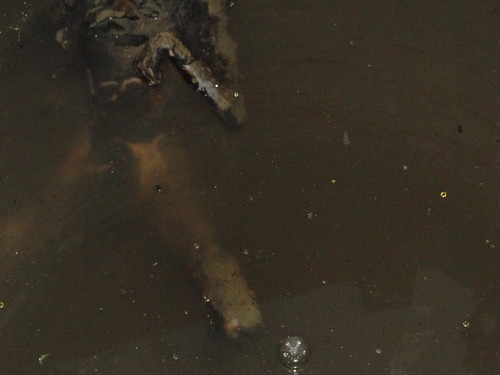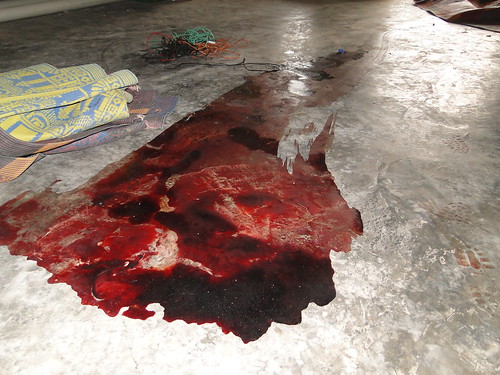By TCN News,
Jaipur: A public hearing on Gopalgarh violence (September 14, 2011) on Muslims who are still struggling for justice was held in the city at Samgra Seva Sangh Campus.
A large number of victims of the violence, witnesses and social activists from different organizations, including the PUCL attended the meeting. National secretary of the PUCL Chitranjan was one of the juries.
The hearing was organized by INSAF Rajasthan of Alwar whose office bearers Virendra Vidrohi, Maulana Hanif, Sahib Singh and others were also present. Others who were present were Sawai Singh, Chairman of the Samgra Seva Sangh and Sadbhawna Manch, Professor M Hasan, former professor HCM RIPA who has been assiduously following the CBI inquiry by interacting with government functionaries, the victims and several organizations, Shabbir Khan, noted theater artist, and Maulana Wahid Khatri of the Jamiutul Hind.

Burnt and charred body, thrown in a well in the premise of Eidgah
The victims and witnesses of the crime graphically narrated sequence of the violence on September 13 and 14, 2011 in the mosque, scenes in the police station and streets.
Sardar Khan son of Nuhar Khan, village Bhada, who came to Gopalgarh for his routine shopping went to the mosque for prayer at 4 pm and was caught in cross fire. He was mercilessly beaten by police and Gujjars so much on head and body that he remained in hospital for several days and is still suffering loss of memory and has periodic bouts of pain.
‘I got pellets on my spindles and hands.’ His whole money from pocket was taken away. He said he heard while lying on ground bleeding that ‘leave him he is an old man.’ But the police said: ‘What is the difference between an old and young Muslim? He is a Muslim anyway!’ ‘Then,’ he said, ‘we were given a merciless beating by blunt equipments and lathis.’ I am still unwell and am under tremendous mental shock. I have often severe pain in the head.’ Four police men came out and dragged some dead Muslims and set their bodies on fire in nearby firewood heaps and cow dung silos. I heard the imam Shabbir shouting ‘run away!’ But he was severely beaten and set on fire. He died in SMS hospital.
Hamid Khan, son of Sumer Khan, aged 65, Pilsu village: he also came at about 4 pm for ashr prayer in the mosque after his work in the bazaar. I was first hit by a lathi and then by a farsa (sharp edged arm). I became unconscious and was taken to Bharatpur and from there to SMS hospital where I stayed for 15 days. He saw two police men came with rifles from vajra vahan leading a pack of the Gujjar attackers. They did fire from their rifles. We were given a wholesome threshing (moonj bana diya ‘were made pulp.’)
Shahabudin, aged 45-50, son of Wazeer, Gopalgarh: We had a meeting in the mosque in the morning on 14th Sept. in which only 150-200 at the most were there. Not more than that at all. we had satisfactory meeting with the CEO and SDM (from Deeg) who advised us to register FIR rather than hold a long meeting in the mosque. We agreed. And the people started dispersing. When we were coming from the mosque in groups of twos and threes for going to the PS for FIRs we were accosted by several belligerent Gujjars. One Gujjar, brother of Arjun, threateningly put a huge wooden staff on my abdomen to barricade my way. Then someone shouted, mercifully, ‘Bastards what are you doing? He is from our place! Attack those from outside.’ Then they ran after other Muslims.
Noor Mohd, aged 50 years, son of Chhotna, Gopalgarh: We had assembled in PS. It was agreed to have a compromise. And the compromise was arrived at after Sheri Panch tendered apology in presence of all: DM, SP, MLAs, other policemen and sarpanch and local people.
Suddenly some people came who misbehaved with the DM and other officers. It was appalling to see how a DM and SP crumbled under pressure and did not arrest a few hoodlums, but ordered for firing as dictated by some rowdy elements from RSS.
We saw deteriorating situation and realized that we were not safe at all in the PS. So somehow we escaped and reached home. In the evening in dark we left the town with our family. Since a Curfew was imposed police didn’t allow us to carry our necessities! My house was ransacked and electrical goods were damaged and looted. My brother in law’s shops and houses were looted and damaged in police presence, reducing our family pauper. Because we no we donot have any business and our shops are no more, Abdul Gani’s house’s electric connection was disconnected for months. We are being treated inhumanly. We are ruined financially and emotionally with four persons in jail.
(Also read: Police joined Gujjars in firing at us, say Gopalgadh riot victims)
Some of the major findings that emerged from the public hearing were:
The victims and witnesses were keen to give statements but were found to be mortally scared of police and CBI. They were scared of CBI because it arrested five people by deception in the name of giving them compensations.
Therefore, it was decided that the witnesses need moral support from intrepid social activists who can be present during giving the statement to the CBI as well who may encourage victims and witnesses to come and give their version for the sake of larger justice. That would strengthen hands of the CBI and other investigative agencies.
It was unanimously held that the local police, particularly the ASP Om Prakash Meghwal, SP Hinglaj Dan and the DM Krishan Kunal committed dereliction of duty on the one hand and some of them even colluded in the crime, on the other, due to deep seated prejudices against minorities.
After analysis of the follow up actions by government, it was alleged that the whole bureaucratic set up from district administration to state secretariat there were apparent efforts to deny justice to the victims and protect the guilty officers who colluded and allowed the heinous crime. People wondered what self interest government is serving by getting its name tarnished by siding with the guilty officers by its own moves.
These collusive moves include: Not seeking caveat in the CAT when the DM and SP approached it for revocation of their suspension orders; not filing review petition assiduously to the CAT against its judgment revoking suspension; and not filing appeal in the Rajasthan High Court against the CAT judgment; not charge sheeting these officers during the suspension period thus allowing them to approach the court; not instituting Departmental Administrative Inquiry to uphold their suspensions. Without justifying of suspensions by the government, naturally, court revoked these suspensions. One speaker wondered why did, in the first instance, the government suspend these officers if it was not convinced to go to CAT and High Court for justifying its actions? The government caused embarrassment to itself.

The way and with slow speed the government made transfers and moved papers/files for prosecution and inquiry shows its unwillingness to give justice to the victims and punishment to the guilty.
For various reasons, particularly petty land, cattle, vehicle etc disputes, poor Mewatis are mortally afraid of police officials who without any hitch and fear can threaten the victims if they give statement against police and men of muscles among the Gujjars. This fear has also generated a pervasive sense of distrust against each other, against government, against CBI, or any institution because they believe justice is not for them. This is a dangerous trend which must be arrested by social workers and government policies somehow.
Participants expressed at the slow pace of inquiry and judicial system which have allowed five innocent victims to remain in jail since more than a year.
Vidrohi warned the audience that the whole approach and philosophy of the National Capital Region is to destroy the Mewat region, and particularly the financial base of the Muslims due to prejudices and policies of the government on land. It is a conspiracy against the farming people of the area. Violence is a vehicle to uproot them by giving them shock and awe of police.
Virendra Vidrohi said that for police Mew Muslims are a golden hen laying golden eggs. They are induced to commit crime and then are blackmailed for bribe and what not. That is why Mews fear police which others in Jaipur can not understand and measure the depth of fear. They have to be rescued from this vicious circle of fear and helplessness.
Subrati of Sihawli village said that for three days were under curfew and police did every thing to destroy evidences. We were not allowed to come out. For three days of curfew it was said by the government that only three persons died. Where as it was more than three persons.
It was also narrated how Kale Khan Mew was killed in Tijara by SP Pathak and then his body was thrown in a well alleging that he committed suicide. That miscarriage of injustice emboldened police to enact the Gopalgarh episode.
It emerged that by letting such acts happen, the Congress government is conceding electoral, political and moral space to Rightist Hindu elements. And this is amazing.
Because of this fear, the victims and witnesses expressed unwillingness to give statements in Bharatpur which they said was hostile to them. They said that they would like to give their statements only in Pahadi or Alwar which are somehow ‘safer.’ Therefore, this was conveyed on the spot to the CBI to have statements recorded only in Pahadi for which the CBI agreed. For next batch of statements by victims Alwar would be decided as the place.
In order to boost the morale of the victims and witnesses a team of social activists would go to Pahadi and Gopalgarh for facilitating of recording of statement in the CBI. Those who expressed willingness were Prof. M. Hasan, Virendra Vidrohi, Maulana Hanif; Munshi Khan; and members of the Rajasthan Muslim Forum.

